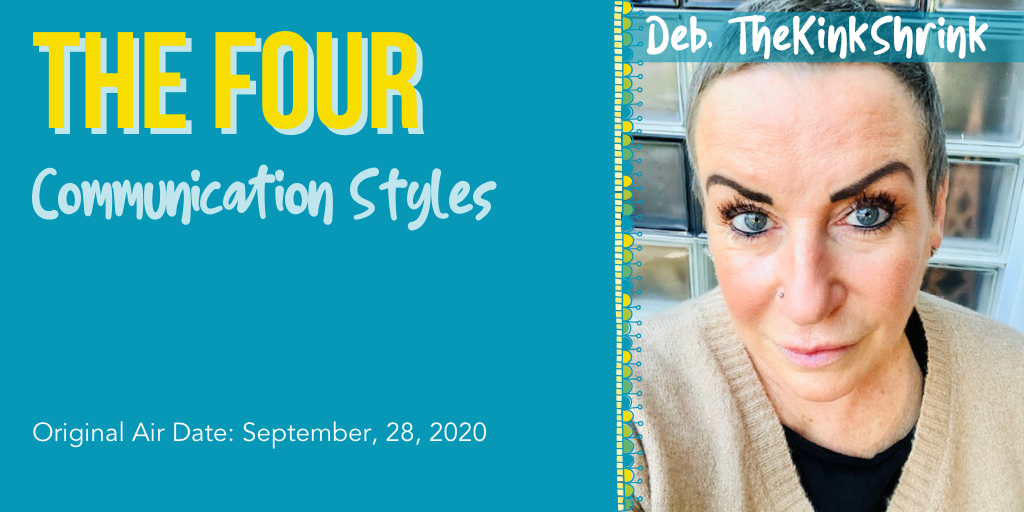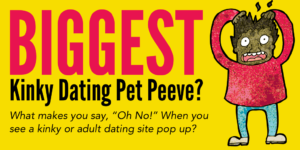On September 28, 2020, Deb, TheKinkShrink presented the topic “Multiple people + multiple communication styles = multiple possible problems, let’s change that math!” for Dating Kinky’s It’s Not Cheating weekend focused on nonmonogamy. The original presentation was free to all who joined us live, and was recorded for Dating Kinky’s PLUS members to access through the Dating Kinky Library (over 400 videos and 550 hours of content!).
Here is a clip from that 70-minute show, where she talks about the four communication styles.
https://youtu.be/x0LopaJCc8s
TRANSCRIPT
So there are four communication styles in the way that we work. So—and they’re simple when When you think about them.
We we have passive communication.
So, passive communication is really quite submissive.
They’re acting diffidently, they always yield to you, they don’t really express their feelings or their needs very much.
Now, you’re either recognizing yourself or you’re potentially recognizing one of your partners.
Especially in poly, you’ll have one person that dominates a conversation and maybe some of your other partners don’t, especially if you’re all meeting—or YOU dominate, while the other person doesn’t, or vice versa.
The problem is with a passive communicator, they’ll often build up anger/resentment.
But they can also be really safe to deal with when conflict arises.
It’s really lovely to have somebody who’s a passive communicator to listen to you, because they’re gentle and sweet and kind. However, it also means they won’t sort their shit out when it’s going bad, and then they’ll always defer to others and that resentment will build up and be a hell of a lot worse.
Passive communicators: poor body language. Look down, look away, hesitate, “Well, you know
like, yeah, No, I don’t mind. It’s fine.”
And it’s that—there’s a youthfulness or youngness to that which also makes you get cross with them, sometimes.
“Just fucking say what you want!”
So that’s really difficult.
“So, you know, well, what, I’m easy, whatever,”
I mean, when you ask someone what they want for takeaway, a passive person will often say, “I don’t mind, you choose whatever, I’m easy,” but they bloody hate Indian takeaway, or Chinese and you order it, and they’ll pick at it because they haven’t stated what they wanted.
So, that’s quite difficult.
And aggressive communicators—aww, you know them—you know them really quickly: loud, demanding, taking over, intense eye contact all the time, when you want to find out, you know.
Like, like “Jesus, alright, am I on a TV show or something?”
And they can be quite intimidating, and quite blaming.
Which is…they’re quite critical.
Threaten. Attack. and they often don’t ask questions. They say, “Right, you need to do this,” and they don’t listen to what’s going on.
However, they’re also great leaders, so you might find these people are more your dominant types of personalities, if they haven’t developed the listening skills yet, and some people can have a bit of both, but it’s very much, “I’m right. You’re wrong.”
“I’m big, you’re small.”
“It doesn’t matter.”
Or “It’s your fault.”
There are the negatives.
But the positives are that, you know, they can be really good leaders in times of a crisis.
You’ve then got a very typical British form of communication, English form of communication, which is passive-aggressive.
So it seems really passive, it looks really gentle and really nice, but that resentment that builds up?
Yeah.
That would then create some conflict so they don’t acknowledge their own anger, they don’t use their facial expressions properly, because you can see a contradiction.
“Yeah, no. I’m fine with that. It doesn’t matter.”
And that face comes along.
So, they’re really angry underneath.
They’re aware of their needs, but they just don’t know how to tell you what their needs are.
“Yeah, that’s fine with me, but, you know, don’t get surprised if she doesn’t say it’s okay.”
What? How? Where did that come up? Or, and “Yeah, yeah, yeah! Course we can do it! (Won’t work.)” and so they always have a little second rephrase after a conversation.
Then we’ve got THE most effective form of communication, which is assertive. So, and that’s what it’s thought, but it’s not always.
But the assertive form of communication, it’s open. They express their own needs, their wants, their desires.
They understand their feelings and, they can consider what you’re saying and take it into account. They don’t tend to cut you off at the end of a sentence.
They’ll nod, active listeners, and they’re like, “Okay. Yeah. I get that. I really respect that. I can really listen to what you’re saying. I do disagree, and that’s okay, because actually I feel like this when that happens. It’s okay that we both don’t—and I really respect your right to say it that way.”
So that’s quite different.
—
So while I was watching Deb teach this, I could imagine in my mind people I knew from the past in each of these styles.
Could you?
I’m betting you could.
We all know all of these folks.
In fact, we’ve all been all of these folks at one time or another, because different situations will bring out different sides of us.
But like any other personality trait, there is one that we fall back on naturally or most often.
For example, I am assertive, generally. In my daily life and in most conversations, it is easy for me to speak what I feel needs to be said and to listen to and make room for others.
I have been passive in situations I’m not comfortable in or familiar with. I feel like it gives me time to get a feel for what is expected and how to behave. This is pretty rare though. An extreme reaction for me.
In my abusive marriage, I was passive-aggressive. Oh boy, was I. It was a defense mechanism, and an outlet for me, because I didn’t know what to do with all of my feelings, or how to navigate the situation.
Luckily, that gave me insight into the experience, and I can more effectively recognize it in others when it happens, and pause to open a door of communication, and encourage them to step up and speak.
And I don’t really fall into that trap anymore. I recognize it as unhealthy and redirect myself.
Aggressive. I can definitely be an aggressive communicator in the areas I’m passionate about and confident in.
I am a dominant. It’s not that I mean to steamroll people. Just that when my brain kicks into high gear, I get excited and want to share.
And I tell people, “Hey, I’m gonna throw some things out, and they are not the be-all, end-all, so don’t take my enthusiasm as laying down the law. I just like to lay things out on the table for discussion…”
And, another time when I’m aggressive? When I’m in a heated argument. Actually, I’ve been actively working on that. I’m good with words, and I learned long ago that if I use my brain and speak loudly and fast, I can WIN in most rows.
Which, of course, means that we both lose.
But I didn’t know that before.
So, now, I’m working on that pretty successfully, and I am trending back towards assertive even in heated conversations, because I realize that fighting—even fighting and winning—is not what I want in my relationships.
What are your thoughts?
Can you see people in your life communicating in each of the four styles?
Which style fits you best? Do you also embody other styles in different situations? Does that work well for you, or are you working on maybe being better in some ways, and avoiding certain communication styles to better connect with others?
—
You can learn more about Deb, TheKinkShrink here:
https://fetlife.com/users/75363
https://www.patreon.com/TheKinkShrink







